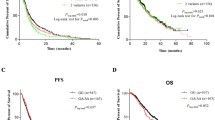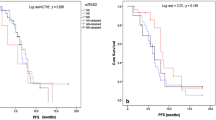Abstract
Lung cancer is the most common cause of cancer death worldwide, and its prognosis and treatment response rate as well as the survival rate remain poor. In our study, we performed next generation sequencing (NGS) with cancer panel (Illumina) for 19 Bulgarian patients with both non-small cell lung cancer (NSCLC; 18 patients) and neuroendocrine tumor (1 patient) and focused on common polymorphisms which define proven or reported sensitivity to platinum-based therapy. We report reference SNP (rs)1042522 (TP53), rs2228001 (XPC), rs2227983 (EGFR), rs1799793, and rs13181 (ERCC2) single nucleotide polymorphism variants which have been detected in our patients in homozygous and/or heterozygous state. Therefore, we give important information to confirm the role of those polymorphisms in tumor resistance and recurrence after chemotherapy treatment. The results reveal that TruSight Cancer Panel could be a useful clinical tool for determining pharmacogenetic variants associated with the effect of chemotherapy.






Similar content being viewed by others
References
Centers for Disease Control and Prevention. Compressed Mortality File 1999–2012, Series 20 No. 2R; 2014.
Cancer Incidence in Bulgaria. 2012. Z. Valerianova, N. Dimitrova, S. Tonev, M. Vukov, p. 35.
Sculier JP, Berghmans T, Meert AP. Advances in target therapy in lung cancer. Eur Respir Rev. 2015;24:23–9.
Joshi M, Rizvi SM, Belani CP. Afatinib for the treatment of metastatic non-small cell lung cancer. Cancer Manag Res. 2015;7:75–82.
Ai X, Shen S, Shen L, Lu S. An interaction map of small-molecule kinase inhibitors with anaplastic lymphoma kinase (ALK) mutants in ALK-positive non-small cell lung cancer. Biochimie. 2015;112:111–20.
Zimmermann S, Peters S. Present standards and future perspectives in the treatment of metastatic non-small cell lung cancer. Cancer Metastasis Rev. 2015:1–10.
Rousseau B, et al. TP53 transcription factor for the NEDD9/HEF1/Cas-L gene: potential targets in non-small cell lung cancer treatment. Sci Rep. 2015;5. doi:10.1038/srep10356.
Lampaki S, et al. Defining the role of tyrosine kinase inhibitors in early stage non-small cell lung cancer. J Cancer. 2015;6(6):568–74.
Reck M, Von PJ, Zatloukal P, Ramlau R, Gorbounova V, Hirsh V, et al. Phase III trial of cisplatin plus gemcitabine with either placebo or bevacizumab as first-line therapy for nonsquamous non-smallcell lung cancer: AVAil. J Clin Oncol. 2009;27(8):1227–34.
Scagliotti G, Hanna N, Fossella F, Sugarman K, Blatter J, Peterson P, et al. The differential efficacy of pemetrexed according to NSCLC histology: a review of two Phase III studies. Oncologist. 2009;14(3):253–63.
Metzker ML. Sequencing technologies—the next generation. Nat Rev Genet. 2010;11(1):31–46.
Meyerson M, Gabriel S, Getz G. Advances in understanding cancer genomes through second-generation sequencing. Nat Rev Genet. 2010;11(10):685–96.
Kan Z, et al. Diverse somatic mutation patterns and pathway alterations in human cancers. Nature. 2010;466(7308):869–73.
Wagle N, et al. Dissecting therapeutic resistance to RAF Inhibition in melanoma by tumor genomic profiling. J Clin Oncol. 2011;29(22):3085–96.
Tibaldi C, et al. Correlation of CDA, ERCC1, and XPD polymorphisms with response and survival in gemcitabine/cisplatin-treated advanced non-small cell lung cancer patients. Clin Cancer Res. 2008;14(6):1797–803.
Hrstka R, Coates PJ, Vojtesek B. Polymorphisms in p53 and the p53 pathway: roles in cancer susceptibility and response to treatment. J Cell Mol Med. 2009;13(3):440–53.
Dumont P, et al. The codon 72 polymorphic variants of p53 have markedly different apoptotic potential. Nat Genet. 2003;33(3):357–65.
Liu L, et al. Combined effect of genetic polymorphisms in P53, P73, and MDM2 on non-small cell lung cancer survival. J Thorac Oncol. 2011;6(11):1793–800.
Alberg AJ, Samet JM. Epidemiology of lung cancer. Chest. 2003;123:21–49.
Ogle KS, Swanson GM, Woods N, et al. Cancer and comorbidity. Cancer. 2000;88:653–63.
Johnson N, et al. Counting potentially functional variants in BRCA1, BRCA2 and ATM predicts breast cancer susceptibility. Hum Mol Genet. 2007;16(9):1051–7.
Kim J, et al. TP53 codon 72 polymorphism associated with prognosis in patients with advanced gastric cancer treated with paclitaxel and cisplatin. Cancer Chemother Pharmacol. 2009;64(2):355–60.
Parmar S, et al. Pharmacogenetic predictors for EGFR-inhibitor-associated skin toxicity. Pharmacogenomics J. 2013;13(2):181–8.
Liu W, et al. Relationship of EGFR mutations, expression, amplification, and polymorphisms to epidermal growth factor receptor inhibitors in the NCI60 cell lines. Clin Cancer Res. 2007;13(22 Pt 1):6788–95.
Sullivan I, et al. Pharmacogenetics of the DNA repair pathways in advanced non-small cell lung cancer patients treated with platinum-based chemotherapy. Cancer Lett. 2014;353(2):160–6.
Lu J, et al. Correlation of rs1799793 polymorphism in ERCC2 and the clinical response to platinum-based chemotherapy in patients with triple negative breast cancer. Int J Clin Exp Med. 2015;8(2):2934–8.
Boige V, et al. Pharmacogenetic assessment of toxicity and outcome in patients with metastatic colorectal cancer treated with LV5FU2, FOLFOX, and FOLFIRI: FFCD 2000-05. J Clin Oncol. 2010;28(15):2556–64.
Giovannetti E, et al. Association between DNA-repair polymorphisms and survival in pancreatic cancer patients treated with combination chemotherapy. Pharmacogenomics. 2011;12(12):1641–52.
Wei S.-z., et al. Predictive value of ERCC1 and XPD polymorphism in patients with advanced non-small cell lung cancer receiving platinum-based chemotherapy: a systematic review and meta-analysis. Med Oncol. 2011;28(1):315–21.
Author information
Authors and Affiliations
Corresponding author
Additional information
N. Chilingirova, Z. Hammoudeh, G. Kurteva, D. Toncheva, P. Chilingirov equally contributed to this work.
Rights and permissions
About this article
Cite this article
Chilingirova, N., Hammoudeh, Z., Balabanski, L. et al. TruSight Cancer Sequencing Panel reveals pharmacogenetic variants associated with sensitivity to chemotherapy in lung cancer. memo 9, 30–38 (2016). https://doi.org/10.1007/s12254-015-0244-2
Received:
Accepted:
Published:
Issue Date:
DOI: https://doi.org/10.1007/s12254-015-0244-2




